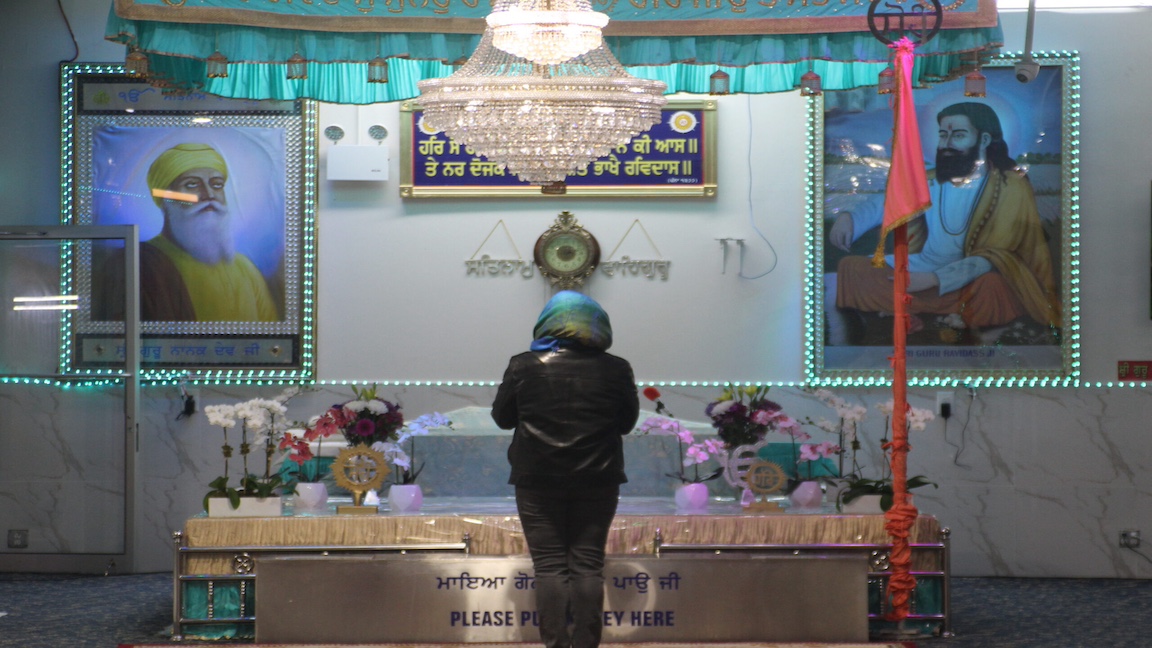
NEW YORK — In the heart of Woodside, Queens, a pink building stands out against the gray January sky. The busy road outside contrasts the serenity inside the building. The Shri Guru Ravi Dass Temple is a Sikh temple, but here, next to praying to Guru Nanak, the founder of Sikhism, people pray for Guru Ravidas, a holy figure known in Sikhism for his rejection of the caste system. It is the only Ravi Dass temple in New York City, and it is located at 6101 Broadway in Woodside, Queens.
On a Saturday afternoon in January, the large space is filled with three men sitting in a circle on a blue and white carpet. A Sikh altar – a palki sahib – stands in the center. Paintings of holy figures decorate the walls. Downstairs, the sharp smell of onions tickles the eyes as people are doing seva, the ritual of selfless service to stand for equality, show humility and help others. Anyone who visits the temple may enjoy a meal made by the volunteers.
In the corner next to the large altar sits Amar Jipt Singh in a distinct space, wearing a yellow turban. His lips, almost hidden in his long white beard, move soundlessly as he shifts his head from left to right, reading the poetry that guides Sikhs in living a faithful life.
Today, January 27th, marks the second day of the 48-hour reading of the holy book, the Guru Granth Sahib. The ritual is executed in honor of major life events, such as marriages, funerals or births. The reading today is in honor of the birthday of Baba Deep Singh, a martyr from the 18th century who devoted his life to the teachings of Sikhism. The continuous, uninterrupted reading of the holy book is called the Akhand Path and is executed by a team of granthis, ceremonial readers, who each read for two hours.
When two women enter the temple and pray in front of Jipt Singh, he raises his voice and the rhythmic words of the Guru Granth Sahib become audible. As the women drop to their knees, Jipt Singh’s deep, low voice fills the room.
The prayer is not meant for Jipt Singh but is a way of paying respect to the holy book, Jipt Singh says after he finishes his reading shift. A young man has taken his place reading the book. “The Granth Sahib serves as a guide to human beings on how to live their life, to control desires and greediness,” he says. Jipt Singh, who is 72, was born in Moga, in India, but moved to New York in 2002. He recently retired from being a taxi driver and cashier at a gas station. With a cup of chai in his right hand, Jipt Singh describes what it means to read the Granth Sahib. “When you are reading and concentrating, you can get a happy peaceful mind,” Jipt Singh says. “But if you’re reading and you think about your car, then it means nothing.”
Not everyone is able to concentrate so deeply, he adds; sometimes his own mind also wanders off. But Jipt Singh says that is okay, as no one can judge what is going on in your mind. He will continue his reading in four hours, from 7-9 p.m., and from 1-3 a.m.
The young man who has taken the place of Jipt Singh continues muttering the Punjabi words written in the ancient book soundlessly. Tomorrow morning the last part of the reading will be done, and the Shri Guru Ravi Dass temple will be filled with 200-300 people who come together to sing, pray and eat, and celebrate the life of Baba Deep Singh.
